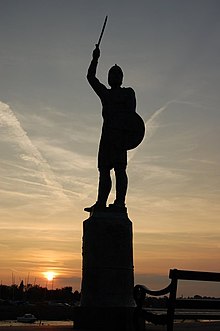The Homecoming of Beorhtnoth Beorhthelm's Son
 |
|
| Author | J. R. R. Tolkien |
|---|---|
| Country | United Kingdom |
| Language | English |
| Genre | play-script (historical fiction) in verse, & commentary |
|
Publication date
|
October 1953 |
| Media type | |
| Preceded by | Farmer Giles of Ham |
| Followed by | The Lord of the Rings |
The Homecoming of Beorhtnoth Beorhthelm's Son is the title of a work by J. R. R. Tolkien that was originally published in 1953 in volume 6 of the scholarly journal Essays and Studies by Members of the English Association, and later republished in 1966 in The Tolkien Reader. It is a work of historical fiction, inspired by the Old English poem The Battle of Maldon. It is written in the form of an alliterative poem, but is also a play, being mainly a dialogue between two characters in the aftermath of the Battle of Maldon. The work was accompanied by two essays, also by Tolkien, one before and one after the main work. The work, as published, was thus presented as:
The play itself is the story of two characters, Tidwald (Tida) and Torhthelm (Totta), retrieving the body of Beorhtnoth, Ealdorman of Essex, from the battlefield at Maldon. After a brief search they eventually find their lord's battle-mangled body and his golden sword. In the middle of the action, Totta slays an English battlefield-looter, for which Tída chastises him. The murder provides an opportunity for the characters to discuss the ethics of Beorhtnoth's actions. Totta is a romantic who thinks Beorhtnoth's actions were tragically noble, while Tída is the battle-experienced farmer who takes the realist position, pointing out the folly of Beorhtnoth's decision to let the Vikings cross the causeway. Eventually the two characters load the lord's body onto a cart, and the drama closes with them leaving the battlefield for a nearby abbey in Ely.
Literary critics generally agree that "Homecoming" is Tolkien's biting critique of the northern heroic ethos. For example, using Tolkien's original drafts of "Homecoming," Thomas Honegger reveals that Tolkien was especially concerned with casting Beorhtnoth's pride in a wholly negative light. George Clark also points out that Tolkien's reworking of The Battle of Maldon specifically "chastises" Beorhtnoth for his pride and generally criticizes the Anglo-Saxon heroic ideals of pursuing fame and material wealth (41). Taking a similar position, Tom Shippey argues that Tolkien's condemnation of Beorhtnoth in "Homecoming" is "an act of parricide" against his Old English literary forebears, in which "[h]e had...to take ‘the northern heroic spirit’ and sacrifice it" (337).
...
Wikipedia
